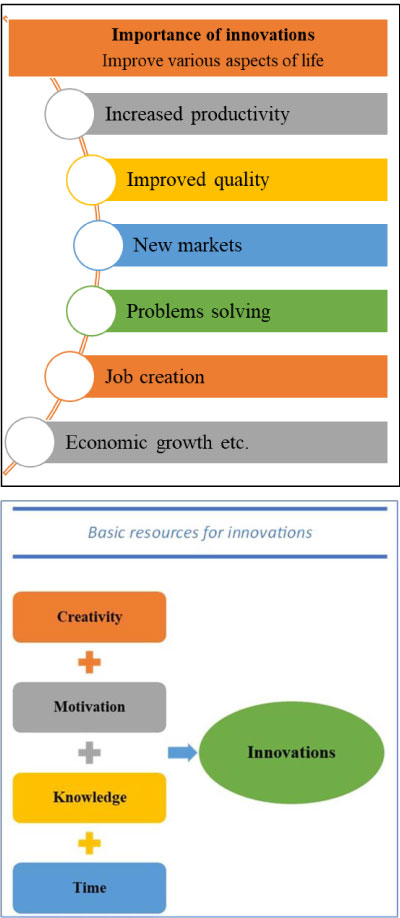Saturday Feb 07, 2026
Saturday Feb 07, 2026
Monday, 28 August 2023 00:27 - - {{hitsCtrl.values.hits}}

Effective leaders of organisations play a crucial role in fostering a culture of innovation by providing unwavering support to their employees
 Innovation refers to the process of introducing new ideas, methods or technologies that bring about significant improvement. It involves creating something unique or improving existing concepts to address specific needs or challenges. Innovation can occur in various fields including technology, business, science and even art. It plays a crucial role in driving progress and advancement in society by fostering creativity and pushing boundaries.
Innovation refers to the process of introducing new ideas, methods or technologies that bring about significant improvement. It involves creating something unique or improving existing concepts to address specific needs or challenges. Innovation can occur in various fields including technology, business, science and even art. It plays a crucial role in driving progress and advancement in society by fostering creativity and pushing boundaries.
Some organisations may experience stagnation due to complacency or resistance to change. They may continue to operate in the same way without adapting to new demands or opportunities. This can lead to a decline in competitiveness and potential obsolescence of the organisation. This article aims to offer insights briefly into the role of innovation in nation building, which might redefine our future.
Innovations in the public sector
Innovations in the public sector involve the introduction of new ideas, technologies and approaches to improve the efficiency, effectiveness, and responsiveness of government services.
Innovations play a pivotal role in the public sector of developing countries by igniting transformative change and driving progress. These countries often grapple with resource constraints and complex challenges, making innovation a necessity for achieving efficient service delivery, sustainable development and improved quality of life for citizens. Therefore, innovation in the public sector of developing countries is not just an option, but a catalyst that empowers nations to capitalise on opportunities and pave the way for a brighter future.
 Conducive environment
Conducive environment
Creating a conducive environment for innovations within an organisation requires a delicate balance of factors that foster creativity, collaboration, and experimentation. Firstly, an open and inclusive culture is essential, where all employees feel empowered to share their ideas without fear of criticism. This environment encourages diverse perspectives and ensures that innovative concepts are not dismissed prematurely. Secondly, clear communication channels are vital to facilitate the exchange of ideas across departments and hierarchies. An organisation that promotes cross-functional collaboration provides opportunities for different skill sets to converge, sparking innovative solutions that might not emerge within isolated silos.
Innovators and followers
Categorisation of employees into innovators and followers can provide insights into their roles and contributions within an organisation. Innovators and followers form a dynamic partnership within organisations. Their ability to think outside the box and take calculated risks leads to the development of groundbreaking ideas, products and strategies that keep organisations competitive and adaptable. On the other hand, followers provide the necessary structure and pragmatic implementation that ensures innovative ideas translate into tangible results. Their attention to detail, process orientation and execution skills are essential for turning visionary concepts into viable projects. However, achieving a balance between innovators and followers is crucial for a well-rounded and dynamic ecosystem.
Competition for innovations
Encouraging competition within an organisation can bring about a multitude of benefits that foster growth, innovation and overall excellence. Firstly, healthy competition inspires employees to continuously strive for higher levels of performance and productivity. Importantly, competition can enhance employee engagement and job satisfaction. The excitement of competing and the recognition that comes with winning can boost morale and foster a sense of pride in one’s work. This, in turn, can contribute to higher levels of job satisfaction and retention rates within the organisation. However, competition should be healthy and collaborative.
Measuring innovations
By monitoring the innovation process effectively, it can be clearly seen who or what influences innovation and act to increase it. Innovation indices are quantitative measures used to assess and compare the level of innovation within different countries, regions, or organisations. Some of the well-known innovation indices include Global Innovation Index (GII), Innovation Union Scoreboard (IUS), Bloomberg Innovation Index, etc. These indices can provide valuable insights in understanding and promoting innovation, keeping in mind their accuracy and relevance might depend on the specific context and objectives.
Key quantitative indicators that countries can use individually may include the number of new products, processes, or patents developed, as well as the percentage of revenue derived from new products and services developed through innovations. However, qualitative measures are equally important, encompassing factors like employee engagement in innovative projects, the degree of cross-functional collaboration and the organisation’s ability to adapt to changing market dynamics.
Rewarding innovations
Rewarding innovations is a pivotal practice that not only acknowledges and celebrates the initiative of employees but also promotes continuous improvement. Such rewards can encompass financial incentives, career advancement opportunities or public recognition, all of which serve as powerful motivators to encourage employees to contribute groundbreaking solutions.
Recognising high-standard innovations reinforces the importance of excellence and provides a clear benchmark for substantial contributions that significantly impact industries and society. Simultaneously, appreciating playful innovations acknowledges the value of unorthodox thinking and fosters an environment where creativity thrives. By embracing both ends of the innovation spectrum, organisations and societies promote a holistic culture of ingenuity, encouraging a diverse range of thinkers to contribute their unique perspectives and talents, ultimately leading to comprehensive and groundbreaking advancements.
Lack of recognition
The consequence of not recognising innovations can be detrimental, leading to missed opportunities for growth, diminished motivation among creative minds and a stagnation of progress. When innovative efforts go unnoticed or unacknowledged, individuals and teams may lose their incentive to invest time and energy into generating new ideas or solutions. It can also result in innovators seeking environments where their contributions are valued.
Integration into educational curricular
Encouraging a child’s innovation should start as early as possible. Children naturally have curious and creative minds, so it is important to foster and nurture these qualities from a young age.
Incorporating innovations into school and university curricula is of paramount importance as it equips students with the skills, mindset and adaptability necessary to thrive in an ever-evolving world. By exposing students to innovation principles, problem-solving methodologies and creative thinking exercises, educational institutions can prepare them to address real-world challenges with ingenuity. Moreover, this approach nurtures a generation of critical thinkers who are well-equipped to navigate complex landscapes, collaborate effectively and contribute fresh perspectives to various fields, ultimately contributing to societal progress and sustainable growth.
Contribution by the leaders
Effective leaders of organisations play a crucial role in fostering a culture of innovation by providing unwavering support to their employees. Firstly, they should encourage open communication, actively listening to and valuing diverse ideas from all levels of the organisation. By removing barriers to idea-sharing, leaders create an environment where employees feel empowered to contribute their unique perspectives. Secondly, leaders must allocate resources, both financial and time, to support innovation initiatives, demonstrating a commitment to turning ideas into tangible outcomes. This includes providing access to training, technology and mentorship to enhance employees’ innovative skills, etc.
Additionally, leaders should recognise and reward innovative efforts, celebrating both successes and failures as valuable learning experiences. Lastly, leaders need to lead by example, embracing change and displaying a willingness to take calculated risks themselves, thus inspiring their teams to step outside their comfort zones and pursue innovative solutions.
Economic growth
Innovations serve as the cornerstone for driving economic growth by propelling industries forward, creating new markets, and enhancing productivity. As such, innovations are of paramount importance in addressing Sri Lanka’s current economic crisis, as they hold the potential to spur job creation, enhance productivity across sectors, attract foreign investment, and establish new revenue streams. By fostering technological advancements, promoting entrepreneurial ventures, and modernising traditional industries, innovation can play a pivotal role in revitalising the economy, mitigating the crisis’s adverse effects and positioning the country on a trajectory of sustainable growth.
Conclusion
The link between innovation and progress underscores its paramount importance in today’s rapidly evolving world. As the catalyst for growth, innovation has the power to reshape industries, drive economic development and improve the quality of life for individuals. Embracing innovation has now become not merely an option but a necessity.
By continuing with no innovations and relying solely on the achievements of past generations, organisations do limit the potential to create new solutions, explore uncharted territories and address current challenges. Innovation empowers us to build upon the foundation laid by our predecessors, propelling society forward and ensuring that we contribute meaningfully to the advancement of knowledge and progress. A system that lacks innovators and relies solely on followers is at risk of becoming stagnant and unable to adapt to new challenges.